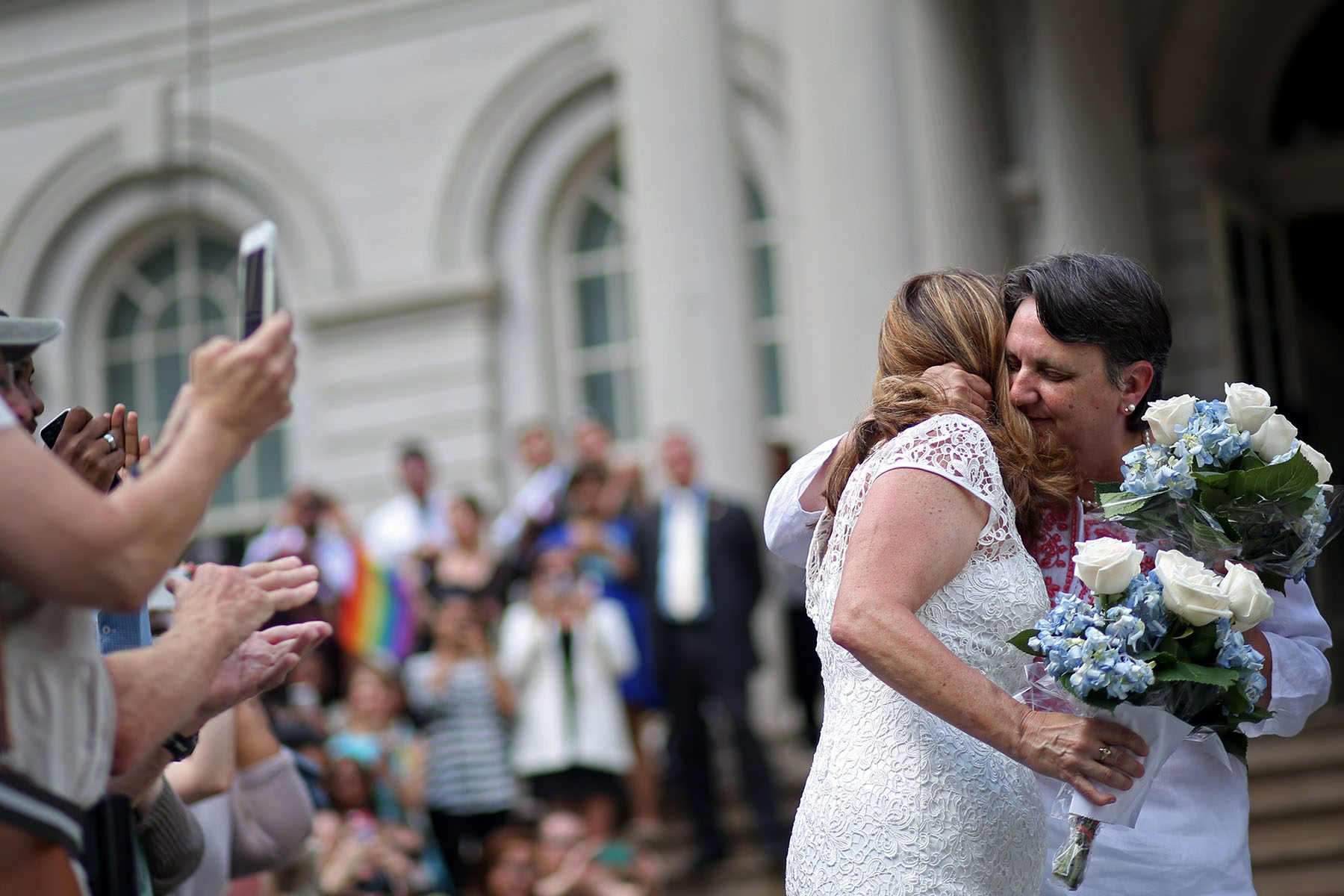The U.S. House approved legislation Thursday to shore up marriage rights for LGBTQ+ couples. The Respect for Marriage Act has been hailed by lawmakers as a landmark law that will protect queer Americans for generations to come.
The Senate advanced the bill last month, and President Joe Biden is expected to sign it.
But the bill doesn’t codify the Supreme Court’s 2015 Obergefell v. Hodges decision that granted LGBTQ+ couples the right to marry. Instead, it forces states without marriage equality laws to recognize LGBTQ+ marriages from other states.
It also declares all legal marriages in the United States must be recognized, even across state lines. That means if a marriage is recognized in Maine, it must be recognized in Texas. That part is seen as critical so that queer families can cross state lines to get married even if their home states don’t offer those rights. It also means that married couples can travel without having to worry that a hospital in another state won’t recognize their marriage in the event that one spouse has an emergency and another needs to visit or make medical decisions on their behalf. The same would be true for interracial couples, who the bill also protects — although the justices have not indicated that interracial marriage rights should be reconsidered.
What does the bill mean for people who are already married but live in states that ban LGBTQ+ marriage?
LGBTQ+ people who are already married in states with bans would continue to be married. LGBTQ+ people who want to get married in 32 states without equal marriage rights would have to cross state lines to get married, and their home state would have to recognize their union.
National LGBTQ Task Force Policy Director Liz Seaton, added, however, that many states would likely face tremendous pressure not to enforce their LGBTQ+ marriage bans.
“The vast majority of people in this country support marriage equality,” Seaton said. “Because there’s old laws on the books doesn’t mean that the state necessarily has to do anything with them.”
Does this bill have religious exemptions, and what are they?
Yes. Like current law, the bill states that churches, mosques, synagogues and other houses of worship don’t have to perform LGBTQ+ marriages if it goes against their beliefs. The same is true of nonprofits formed for religious purposes. That does not necessarily include religious nonprofits or businesses that formed for other purposes. For example, a charity taking state taxpayer funds would still have to follow state law.
Does this bill change anything right now?
In terms of impacts on LGBTQ+ day-to-day life, nothing has changed, and it won’t unless the Supreme Court overturns its Obergefell decision. The 2015 decision granting marriage equality nationwide remains in effect, and LGBTQ+ people can continue to marry in every state. Moreover, Congress continues to stall on anti-discrimination protections for LGBTQ+ people first introduced in 1974. That said, the vote does send a message that a bipartisan group of lawmakers can come together to protect LGBTQ+ rights, and that could be critical for future legislation.
Is there a way to reinstitute marriage equality nationally if the Supreme Court strikes it down?
Legal experts aren’t totally sure, but the general consensus is that it would be very challenging to do. States, not Congress, legislate marriage rights, so many legal experts have concluded that Congress can’t pass a bill that compels states to issue marriage licenses to LGBTQ+ couples. Some advocates have suggested that an amended version of the Equality Act, the anti-discrimination protection bill pending in Congress, could provide a venue for securing those rights. Still, versions of that bill have stalled in the legislature for nearly 50 years.
People have called this bill historic. Why is that?
Congress has passed only two LGBTQ+ bills in history. In 2009, the legislature passed the Matthew Shepard and James Byrd Jr. Hate Crimes Prevention Act, which increased punishment for crimes motivated by sexual orientation and gender identity, as well as race. That bill has come under scrutiny in recent years because some experts have found that hate crime laws often disproportionately increase incarceration among people of color but have shown little evidence of curbing violence. The following year, Congress repealed “Don’t Ask, Don’t Tell,” a law that forced LGBTQ+ military service members to conceal their sexual orientation.
The Respect for Marriage Act marks the most significant piece of pro-LGBTQ+ legislation enacted by Congress and an unprecedented show of bipartisan support for queer rights, advocates say. “This legislation, while a sliver of what we need, is extraordinary, because it enshrines protections for queer families, at least those who choose to marry, with protections in the U.S. code,” Seaton said.








